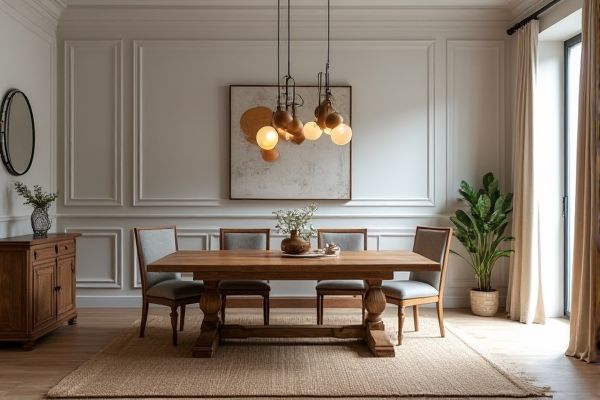
Trestle tables feature a sturdy frame with two or more supports connected by a central beam, offering excellent stability and legroom, while farmhouse tables emphasize rustic charm with a solid, often distressed wood top and simple, robust legs designed to create a cozy dining atmosphere. Explore the key differences, benefits, and how to choose the perfect style for Your home in the rest of this article.
Table of Comparison
| Feature | Trestle Table | Farmhouse Table |
|---|---|---|
| Design | Simple, two legs connected by a horizontal beam | Rustic, solid wood with thick legs and a sturdy apron |
| Material | Typically wood, sometimes metal supports | Primarily solid wood like oak, pine, or walnut |
| Stability | Stable but can wobble if not secured | Very stable due to robust construction |
| Style | Minimalist, traditional, often rustic | Country, rustic, farmhouse charm |
| Functionality | Easy to disassemble and move | Heavier, built for permanent placement |
| Seating Capacity | Flexible, seats 4-8 depending on size | Usually seats 6-10 comfortably |
| Usage | Dining, work, multi-purpose table | Dining table, centerpiece in farmhouse decor |
Understanding Trestle Tables: Key Features
Trestle tables are characterized by their sturdy framework consisting of two or more trestle supports connected by a horizontal beam, offering both stability and adaptability in length. Unlike farmhouse tables, which emphasize rustic charm and solid wood construction, trestle tables often provide easier disassembly and transport due to their modular design. Your choice depends on whether you prioritize the trestle table's functional versatility or the farmhouse table's traditional aesthetic.
What Defines a Farmhouse Table?
A farmhouse table is defined by its sturdy construction, rustic charm, and practical design, often featuring a thick wooden top with visible grain and simple, robust legs. Unlike trestle tables, farmhouse tables typically have four straight legs or a pedestal base, emphasizing durability and traditional craftsmanship. This style evokes a cozy, welcoming atmosphere reminiscent of rural homesteads, making it a popular choice for kitchens and dining rooms seeking warmth and character.
Design Differences: Trestle Table vs Farmhouse Table
Trestle tables feature a sturdy horizontal beam supported by two or more trestle legs, allowing for ample legroom and a minimalist silhouette. Farmhouse tables typically showcase a solid, rectangular top with robust, often turned legs, reflecting a rustic and traditional design aesthetic. Your choice depends on whether you prefer the open, airy feel of a trestle base or the classic, substantial presence of a farmhouse table.
Durability and Construction Comparison
Trestle tables feature robust horizontal beams supported by two or more legs, providing exceptional stability and strength ideal for heavy use. Farmhouse tables typically have thick wooden tops with sturdy apron frames and solid leg construction, balancing rustic charm with durability. Both designs utilize hardwood materials, but trestle tables often allow for easier maintenance and repairs due to their modular construction.
Style and Aesthetic Appeal
Trestle tables showcase a minimalist industrial style with exposed support beams and clean lines, complementing modern and rustic interiors alike. Farmhouse tables emphasize a cozy, charming aesthetic featuring sturdy legs, distressed finishes, and a warm, inviting atmosphere. Both tables offer distinctive visual appeal, with trestle designs leaning toward sleek functionality and farmhouse models embodying traditional country elegance.
Space and Seating Considerations
Trestle tables offer ample legroom due to their central support, making them ideal for maximizing seating capacity in smaller spaces. Farmhouse tables typically have sturdy legs at each corner, which may limit seating flexibility but provide a classic, rustic aesthetic. Your choice should consider the room size and how many guests you intend to accommodate comfortably.
Versatility: Which Table Suits Your Needs?
A trestle table offers exceptional versatility with its removable legs, making it easy to relocate or store, while a farmhouse table provides sturdy durability and rustic charm that fits well in traditional or modern farmhouse interiors. Your choice should consider the space flexibility you need; trestle tables adapt better to varying room sizes and occasions, whereas farmhouse tables often serve as permanent, centerpiece fixtures. For adaptable dining or workspace solutions, trestle tables excel, but farmhouse tables excel in delivering a warm, inviting atmosphere.
Cost and Value Analysis
Trestle tables generally offer a more affordable option due to their simpler construction and fewer materials, while farmhouse tables tend to be pricier because of their solid wood build and intricate design details. In terms of value, farmhouse tables often provide long-term durability and a timeless aesthetic that can increase home resale appeal. Your choice should balance initial cost with potential return on investment, favoring farmhouse tables if lasting quality and style are priorities.
Popular Materials Used in Each Table Type
Trestle tables are commonly crafted from solid hardwoods like oak, cherry, and walnut, known for their durability and rustic appeal. Farmhouse tables often feature reclaimed wood or pine, offering a weathered, vintage look that enhances cozy, traditional settings. Your choice between these tables can depend on the wood type that best matches your desired aesthetic and durability requirements.
Choosing the Right Table for Your Home
Trestle tables offer sturdy support with a distinctive beam and leg design, making them ideal for rooms requiring a balance of style and functionality. Farmhouse tables bring a rustic charm and wide plank surfaces that create a cozy, inviting atmosphere perfect for family gatherings and everyday use. Consider your space, decor style, and how you use your dining area to choose the right table for your home.
 homyna.com
homyna.com